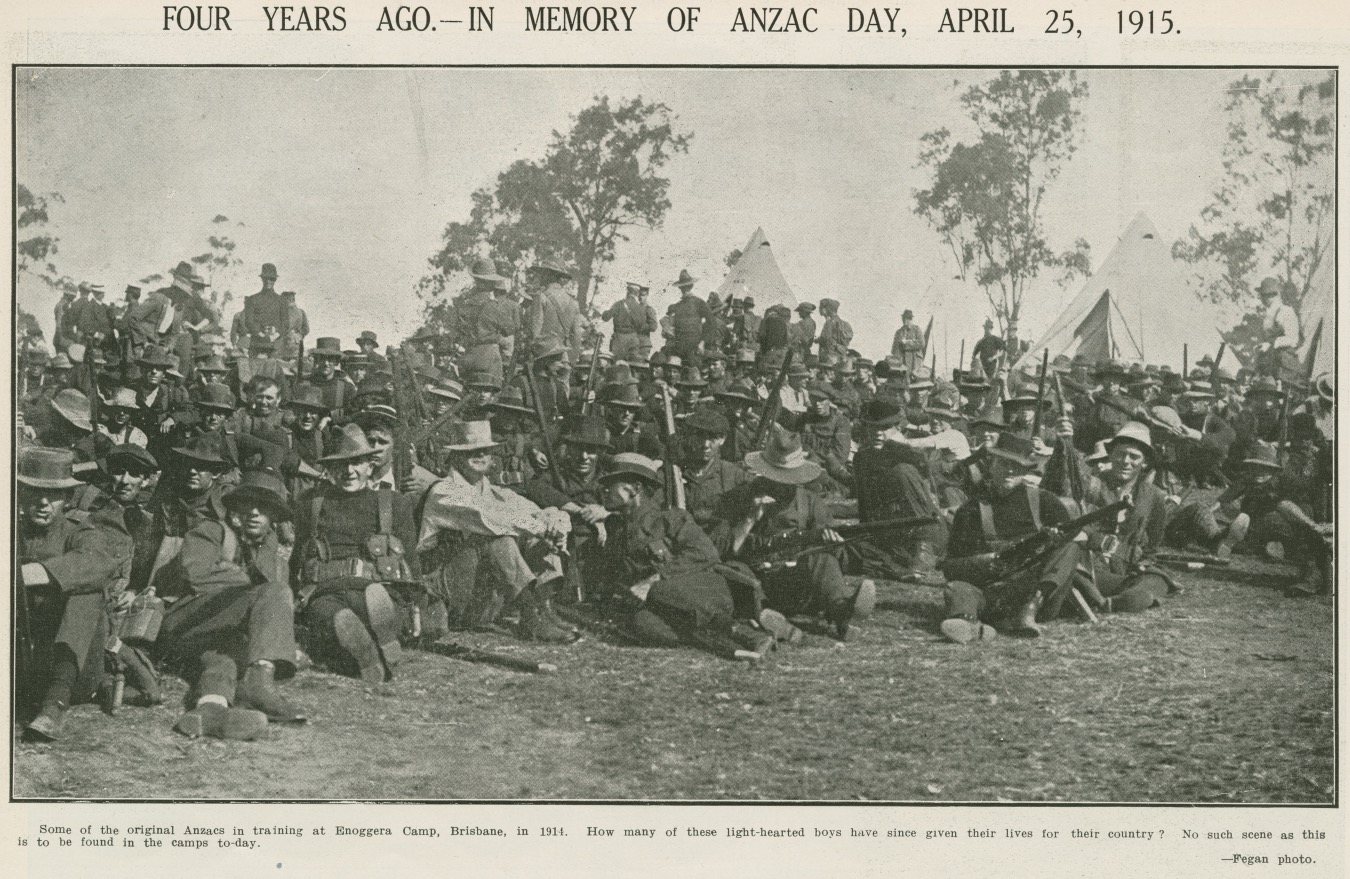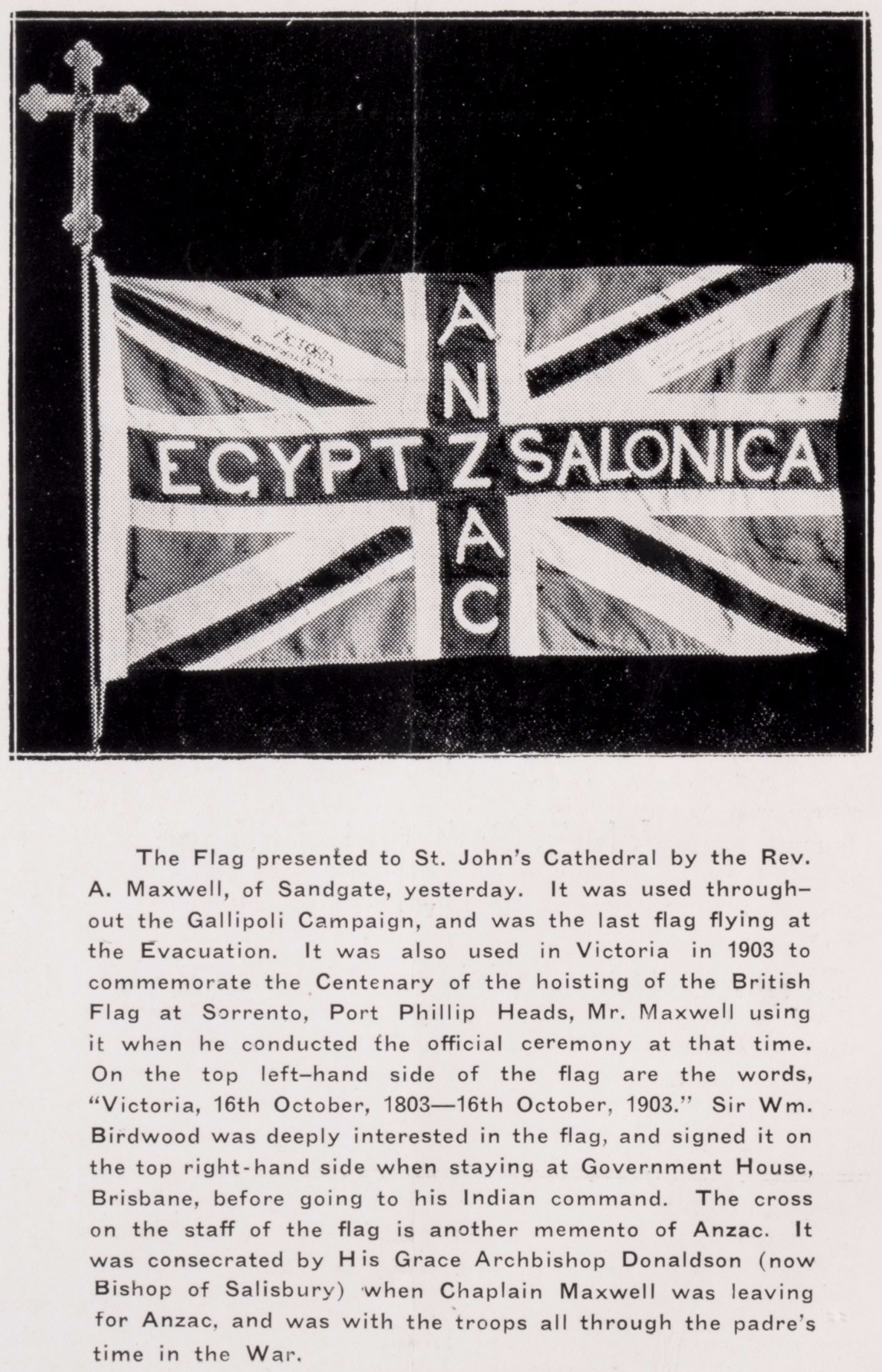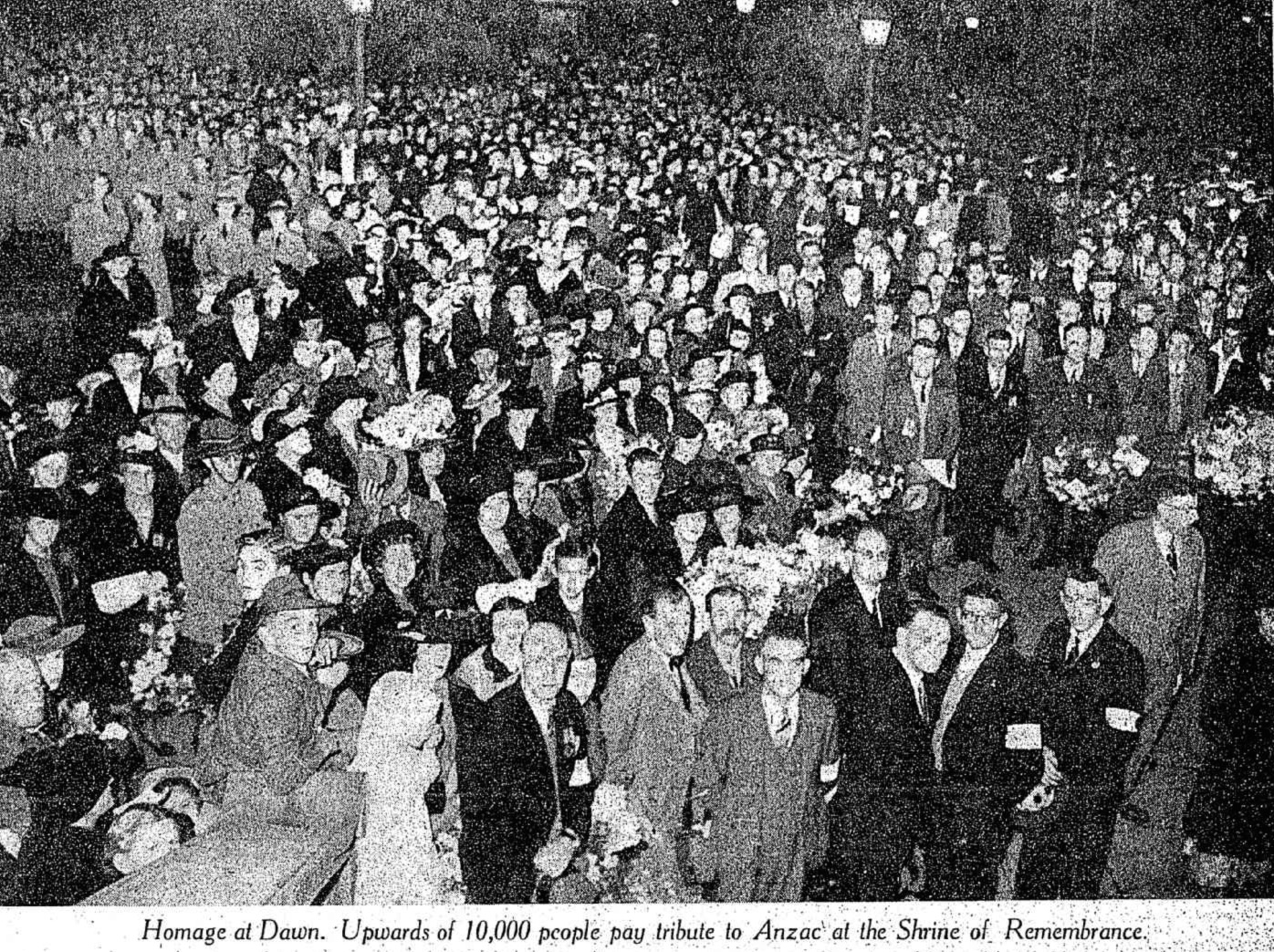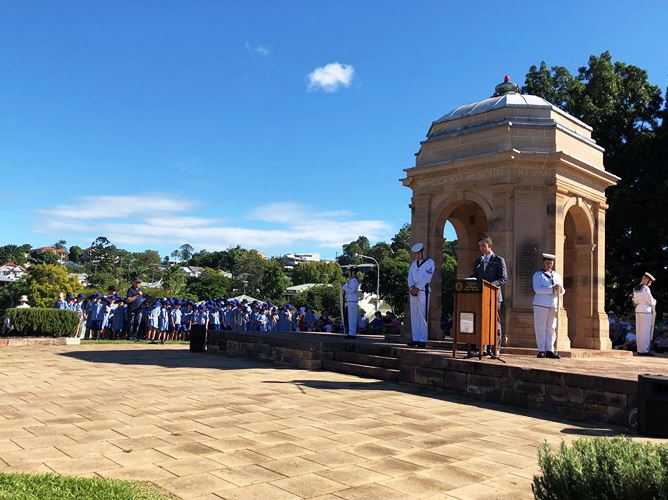ANZAC Day No.3

ABOVE: This poignant photo appeared in “The Queenslander Pictorial” of 27 April 1918 (page 26). It is from the State Library of Queensland’s collection. The caption reads: “Some of the original Anzacs in training at Enoggera Camp, Brisbane, in 1914. How many of these light-hearted boys have since given their lives for their country? No such scene as this is to be found in the camps today.”
ANZAC DAY.
YESTERDAY’S COMMEMORATION.
MILITARY PARADE IN THE CITY.
IN addition to the Anzac memorial services, reported in “The Daily Standard” yesterday [ 25 April 1918 ], there were other notable Church gatherings in Brisbane.
A united memorial service was held in the City Tabernacle, at which the president of the Associated Churches of Christ (Rev. A.C. Rankin) [ Andrew Crighton Rankin ] presided.
He paid a tribute to the peace-loving Australians who, at the call to arms, had rallied to the standard.
All the world wondered at the great charge made on that awful day three years ago.
He gave his tenderest sympathy to those who had lost loved ones, but said they should look to the time when by those sacrifices victory would be ours and in a world freed from jealousies and strife there would have arisen a brotherhood of nations among whom peace would ever rule and righteousness prevail.
Senior Chaplain Rev. A.H. Austin [ The Reverend Alfred Herbert Austin ] also delivered an appropriate address.
The following resolution, carried with the congregation standing in silence, was moved by Senior Chaplain Rev. A.G. Weller (Baptist) [ The Reverend Alfred George Weller ], seconded by Chaplain Rev. Stanley Morrison (Congregational), and supported by Chaplain Rev. W. Griffiths (Baptist) [ The Reverend William Griffiths ] and Colonel H.J. Sharp (Salvation Army) [ Henry James Sharp ]:–
“We, the members of Baptist, Congregational Churches, the Churches of Christ, and Salvation Army, in united service assembled, desire to place on record, on this third anniversary of Anzac Day (1918), our fervent admiration of the continued bravery and heroic endurance displayed by all our colonial forces on sea and land in this great conflict for righteousness and truth.
“Again we desire to express our prayerful sympathy, not only with the sick and wounded, but with thousands both here and in the homeland who are suffering keenest sorrow in the loss of loved ones who have gallantly made the supreme sacrifice.
“We fervently pray that the unity, now existing between the free Churches of this State and the Commonwealth, for the advancement of the Kingdom may be deepened and through the Divine blessing upon our united efforts, there may be granted the consummation of a world-wide peace.”
At the Synagogue last evening there was a service of prayer and meditation, at which the Rabbi, Rev. H.L. Friedlander [ Henry Lesser Friedlander ], officiated.
He preached from the text, “The harvest is past, the summer is over, and we are not saved” (Jeremiah viii. 20).
He said that they were assembled to render homage to the memory of the brave men who fought, bled and died at Gallipoli.
The dead lay on this lonely, inhospitable, and now abandoned cliffs, but the remembrance of all they did, and all their comrades tried to do, would live on.
Their courage and their deeds would uplift us in these days of stress.
They had also assembled to lay their supplications at the throne of mercy, and to offer prayer to Almighty God for His help and His direction in this time of trouble.
The events of the last few weeks had caused deep concern, and given great anxiety to the Jews, who stood in loyalty to our King, zealous to uphold the greatness and prosperity of the British Empire.
The cause of this awful slaughter and the terrible sufferings the past three and a half years was not difficult to discern.
Men asked how could a God who was great,merciful, and beneficent, allow all this, world-wide misery to continue.
The answer was that man had forsaken God, materialism reigns supreme.
If these intersessional services should avail them, if they desired to derive profitable lessons from them, then they must speak the truth and confess that they had strayed from God.
“Let us,” he said, “be courageous, let us pray that the great cause for which the Empire is now struggling may be gained, and thus shall righteousness, justice, truth, and brotherly love prevail over iniquity, wrong, falsehood and hatred.”
The service concluded with the mourner’s doxology and the hymn on the theme of the articles, of the Jewish faith.
At St. Andrew’s, South Brisbane, yesterday morning the Rev. J.S. Needham [ John Stafford Needham ] conducted a special service of solemn supplication.
There was a large attendance, including the Mayor and aldermen of South Brisbane, and many school children.
Holy Communion was celebrated, special hymns were sung, and the service was terminated by the Playing of the “Dead March” [ from “Saul” ].
THE PARADE.
Drizzling rain was falling as the time for the parade arrived.
It was the only function of the afternoon and Albert Square, where the Governor took the salute, was crowded.
A special platform had been erected, in the centre of which was a laurel wreath.
On the platform there was a distinguished gathering, including the Premier (Mr. T.J. Ryan) [ Thomas Joseph Ryan ] and Mrs. Ryan [ Lily Virginia Ryan, neé Cook ], the Mayor of Brisbane (Alderman J. McMaster) [ John McMaster ], and Mrs. McMaster [ Susan McMaster, neé O’Reilly ], various Ministers, heads of the different churches and representative citizens of all shades.
The parade proceeded via the square, up Adelaide Street into George Street, and then through Queen Street, the route being lined by immense crowds.
The parade was headed by a detachment of mounted police, and then followed tangible evidence of the war in the shape of about 50 motor cars containing returned soldiers whoso injuries prevented them from walking.
The District Guard Band preceded the naval reserve men, who looked exceedingly smart, then cheers went up as several hundred returned men swung into view.
The bulk were in uniform, but many were in their civilian clothes.
Some were minus an arm, others limped, and others even walked on crutches.
Never before have so many returned men walked in a procession together in Brisbane.
The Anzac badge was prominent, and men who had not seen each other since they returned, or perhaps were in Gallipoli or France, met yesterday.
It was their day out, so what mattered if they smoked a fag, or two, in the ranks.
A tattered Union Jack, which had been in Gallipoli, was with them, and it was cheered.
As the returned men reached the saluting base there was a halt while the Governor presented the medals, and as each man’s honour was pinned on his breast his comrades gave a lusty cheer.
Following the soldiers were the naval cadets, then came the Light Horse mounted division, Egyptian reinforcements, railway unit, flying corps, infantry reinforcements, reserve unit, the depot band, district guard, the militia men, Army Service men, with waggons, and finally the Army Medical Corps, with an ambulance motor.
In all there were 1,351 troops of all ranks on parade, of whom 513 were returned soldiers.
PRESENTATION OF MEDALS.
Much enthusiasm was manifested in the presentation of medals.
Captain Binnie [ David Johnston Binnie ], himself a returned man, read out the brave action which resulted in the soldier receiving the award and the crowd applauded and cheered.
The Governor [ Major Sir Hamilton John Goold-Adams ] pinned the various medals on each man’s breast, and congratulated him expressing the hope that he would be spared many years to wear the decoration with credit to the soldier and honour to his country.
The list of recipients and the details of the action was published in Wednesday’s “The Daily Standard”.
The men who received the decorations were:-
- Distinguished Conduct Medal
– Sergeant Albert Edwards, 41st Battalion. - Military Medal
– Sergeant (now Lieutenant) A.F. Dingwall [ Alexander Findlay Dingwall ], 2nd Field Artillery Brigade;
– Corporal John McGregor, 2nd Divisional Signalling Company;
– Sergeant J.G. Evans [ John Gomar Evans ], 5th Battalion;
– Private A.A. Voigt [ Albert Andrew Voigt ], 12th Machine Gun Company. - Good Conduct and Long Service Medal
– Corporal F.W. Latchford [ Francis William Latchford ], R.A.G.A. [ Royal Australian Garrison Artillery ]
– Warrant-Officer G. Tregea [ sic, Dr William George Herbert Tregear ], A.A.M.C. [ Australian Army Medical Corps ]
At Townsville the State Commandant (Brigadier-General Irving) [ Godfrey George Howy Irving ] presented the Military Medal and Croix de Guerre to Private Frank Harry Coyte, 25th Battalion, and the Military Medal to Private Ernest Walter O’Brien, 9th Battalion.
The following is a list of honours and awards for services in the field awarded to the members of the Australian Imperial Force in Queensland:
- Victoria Cross, 2
- Companion of St. Michael and St. George (“C.M.G.”), 8
- Companion of the Order of the Bath (“C.B.”), 2
- Distinguished Service Order, 44
- Military Cross, 100
- Royal Red Cross, 9
- Distinguished Conduct Medal, 81
- Meritorious Service Medal, 3
- Military Medal, 371
- Foreign Orders and Decorations, 25.
Total: 645.
Victoria Crosses have been awarded to:
– Private J. Leak [ John Leak ], 5th Reinforcements, 9th Battalion, and
– Private P. Bugden [ Patrick Joseph Bugden ], 9th Reinforcements, 31st Battalion [ awarded posthumously ].
RESOLUTIONS AT THE EXHIBITION.
The Exhibition Hall was filled to overflowing at the evening meeting, which terminated the celebration of Anzac Day, and the memorable landing on the Gallipoli Peninsula was honoured in a manner befitting such an historic event.
The Mayor of Brisbane (Alderman McMaster) presided, and several of the city aldermen were in attendance.
Others on the platform included Archbishop Duhig [ Vincent James Duhig ], Father O’Gorman [ John O’Gorman ] (administrator, St Mary’s Cathedral, Sydney), Messrs. T. J. Ryan (Premier) [ Thomas Joseph Ryan ], W. Lennon (Minister for Agriculture) [ William Lennon ], Archbishop Donaldson [ St Clair George Alfred Donaldson ]; Sir Pope A. Cooper (Chief Justice) [Sir Pope Alexander Cooper ], Mr. Justice Real [ Patrick Real ]; J.M. Hunter, M.L.A [ John McEwan Hunter ].
Several officers and men of the naval and military units occupied seats on the platform, and in the front portion of the building.
The city organist opened proceedings shortly before 8 p.m. by playing “March On the Death of a Hero” (Beethoven).
The Mayor said they were met to celebrate the glorious event of the landing of the gallant Australian troops on the rugged peninsula of Gallipoli.
An eminent military man had said that it was impossible for British troops to land there, but the Anzac had done it. (Applause.)
The deed was one which would live so long as the Empire’s history was known.
The Anzacs had not left their bravery on Gallipoli, but had repeated these gallant deeds in France, Egypt and Palestine.
He felt very proud of the Australians, who had so nobly done their duty, and he asked the audience to rise and give three hearty cheers.
This invitation was heartily responded to.
The Governor said he wished first of all to say a few words to the returned soldier.
He referred to the origin of Anzac Day in Australia, and wished to ask them if they agreed to it.
He believed the movement was originated in Brisbane, and it was believed that the day was one too good to be devoted to junketing and jollity, and should be kept with due reverence to the sacrifices made, and to get people to realise all that had been done, and what yet remained to be done, to ensure the liberty for which this war was being waged.
Originally it was to celebrate the historic landing, but now it assumed a wider sphere, and included all the Australians who had done their part, and he did not think the Anzacs would object to the wider application. (Applause.)
Whatever sacrifices were involved there could be no peace until liberty was made secure, and German militarism suppressed.
They had hoped that the soldiers who safely returned would be re-employed and once more settle down to their old life. He was glad to see that this was in a great measure being realised.
He sympathised with the returned sick and wounded, and hoped they would be speedily restored to health.
He urged them to make the day one for a specific purpose.
There were differences between them, and he hoped that it were possible that the day’s celebration could be made memorable in the bringing together of all sections, and the sinking of all differences, so that they could work together as one to accomplish the work in hand.
Referring to a personal matter, he said he was sorry he had put the Mayor to any inconvenience, but he had definitely given his word for another engagement.
He never lightly broke his word, and he hoped that none would ever ask him lightly to treat his word as a mere scrap of paper.
The Premier read a cable message from Canon Garland [ David John Garland ] wishing Anzac Day every success, and he (Mr. Ryan) wished to pay a tribute to Canon Garland for the work he did in connection with the first Anzac Day.
The landing of the Australians on Gallipoli was a most brilliant episode, and was by no means a failure.
Their gallant deeds both there and in France were typical of the spirit of all Australians.
He hoped Anzac would become a British possession, so that the noble dead should take their lasting sleep in honoured graves on British soil.
They could not blink the fact that democracy was on its trial in fighting against the force and might of the German military autocracy.
To this end they should make an effort to settle all their differences and work unitedly so far as the great war issue was concerned, and in this they had no greater example set them than the brave Anzacs on Gallipoli, who fought and died together. (Applause.)
Captain A.C.V. Melbourne [ Alexander Clifford Vernon Melbourne ] moved the following resolution:—
“On this, the third anniversary of the landing of the Australian troops on Gallipoli this meeting of citizens of Queensland emphasises the unswerving loyalty of the people of this State to the Throne and Empire, and pledges determination to maintain the partnership of national sacrifice which has been sealed already by the blood of Australia’s bravest sons.”
He thought there could be no fitter day than that for the affirmation of loyalty to the Throne and Empire.
The British Empire was one that was unique in that dominion as a self-governing unit.
The rapid growth of this Imperial power had been such that it was now impossible to further expand any one Empire without taking from another, and he asked them to consider what would be the position of Australia were it not for the British Empire and the protection of its mighty and splendid navy. (Applause.)
What could they say of Australia if she refused to assist the motherland which had protected them?
For their own interests they should be with the Empire heart and soul in this present crisis. (Applause.)
Loyalty must be complete, or it was not loyalty at all. It must also be personal, and none should ask others to make sacrifices while they themselves stood idly by. (Applause.)
The motion was carried by acclamation.
Lieutenant-Colonel J. Espie Dods [ Joseph Espie Dods ] moved:—
“This meeting expresses admiration of the magnificent heroism, self-sacrifice, and endurance of the sailors and soldiers of Australia and New Zealand, who, on the first Anzac Day and throughout the great war for the maintenance of justice, liberty and freedom, have shed immortal lustre on the name of their country; and voices heartfelt sympathy with those whose loved ones laid down their lives
for the Empire, and assures the bereaved, and the sailors and soldiers who have suffered, of the undying gratitude of the people, who through the sacrifice retain the blessing of liberty, enhanced by a fuller sense of nationhood and closer and stronger union with the other portions of the British Dominions and also urges upon all who are eligible the imperative duty of following the example of those heroes whose names will be honoured so long as history endures.”
He expressed his pleasure at being asked to move such a resolution, and he wished to remind them of the many gallant deeds that had been done at the famous landing with its many acts of individual bravery.
The speaker then went on to relate many experiences at Lone Pine and other places which showed that Australian valour was unrivalled.
He also paid a special tribute to the regimental stretcher-bearers for the splendid bravery they displayed, and also to the field ambulances. (Loud applause.)
Our men in France who were doing mighty deeds were united as one, and were not divided by sectarian or political issues, and so set a fine example to them. (Loud applause.)
In view of the situation on the Western Front, and the appeal of the British Prime Minister, it would be sheer hypocrisy for them to pass resolutions unless they were prepared to send every eligible man to assist in the great cause which could only be won by all working unitedly together, for the one end they all wished to see. (Loud and continued cheering.)
Suitable hymns were sung, solos were rendered by Mr. W.J. Down [ William John Down ], who sang “Abide With Them” and Miss Jean Edmonds, who sang “A Khaki Lad”.
Mr. H. Borrodale [ Harry Borrodale ] dramatically recited “The Landing”, a stirring epic of Gallipoli, composed by M. Forrest [ Mabel Forrest ].
Mr. E.R.B. Jordan [ Ernest Robert Bannister Jordan ] capably carried out the duties of accompanist.
AT SOUTH BRISBANE.
In the South Brisbane Town Hall last night a large memorial meeting was held, the Mayor (Alderman Forrest) [ Peter Forrest ] presiding.
He trusted that when the history of Australia was written it would show that they had carried out the promises and pledges given to those who had gone to the Front.
Those who had remained behind had hardly yet commenced to realise their responsibilities, but when peace was declared they would have to realise the responsibilities cast upon them by making proper provision for the families of those who had served in the war.
Rev. J.S. Needham [ John Stafford Needham ] said there were four things he would like to say:
They should be loyal to the Empire because it was their own Empire.
They had received benefits from the Empire, and those benefits carried with them certain responsibilities.
They should be loyal to their Empire, because it was the best Empire in history, and lastly the graves of those who had fallen called to them to do their part.
Major J.P. Fry, M.L.A., [ James Porter Fry ] said that by the landing at Gallipoli, Australia became a nation, and he strongly appealed to all to do everything they could to alleviate the distress of those who were suffering through the war.
The names of 200 residents of South Brisbane who have made the great sacrifice were read by the Rev. Joseph Bowes.
The “Dead March” in “Saul” was impressively played by the West End Salvation Army Band.
Adjutant Atkins [ Dale Atkins ], of the Salvation Army, and Captain E.R.B. Pike [ Eustace Royston Baum Pike ] also gave addresses.
During the evening the East Brisbane Methodist Choir, under the conductorship of Mr. F. Robinson, Miss Elsie Gordon acting as accompanist, sang “Australia’s Hymn for Her Dead”, Kipling’s Recessional Hymn, and the anthems, “Comes at Times a Stillness” and “O Father, Whose Almighty Power”.
Mr. F. Slaughter [ Frederick Slaughter ] impressively recited “Our Anzacs”.
TOOWONG’S TRIBUTE.
There was a large gathering in Stephens’s Picture Gardens (Toowong) last evening [ 25 April 1918 ], the Mayor (Alderman A.H. Richer) [ Alfred Hemsley Richer ] presiding.
Rev. Dr. Youngman [ Henry Youngman ], in moving the resolution pledging citizens to a continuance of the war to a righteous conclusion, said they stood together to win or lose – to conquer or be defeated.
Australia had been brought right into the sight of the world by the deeds of the Anzacs at Gallipoli.
Mr. O’Shea, M.L.C., [ Timothy Joseph O’Shea ] considered it an honour to take part in such a commemoration ceremony.
It was an honour to be associated with such men as those who had performed the unparalleled feat at Gallipoli.
It was glorious to reflect on what these Anzacs had done. By their feat Australia had been brought under notice to a greater extent than had been achieved by all previous efforts at national advertising.
Sir A.S. Cowley [ Alfred Sandlings Cowley ] and Rev. W.H. Waters [ William Hermann Waters ] also spoke, and during the evening Mr. H. James sang “The Land of the Red, Red Rose” and Mr. W.H. Longbottom [ William Henry Longbottom ] “The Roll Call”.
A roll of the names of the fallen heroes of the Toowong district was called by the chairman.
The Excelsior Band played “The Last Post”.
OTHER MEETINGS.
Meetings were also held at Ithaca and Stephens, and at both places eloquent speeches were delivered on the set resolutions.
CATHOLIC SOLDIERS’ ENTERTAINMENT.
At the conclusion of the impressive High Mass at St. Stephen’s Cathedral yesterday morning, a large number of returned sailors and soldiers were entertained at a luncheon in St. Stephen’s School.
One of the large classrooms was utilised as a dining-room, and tables were also arranged on the spacious verandas.
The decorations consisted of quantities of chrysanthemums, roses, and asparagus fern artistically arranged.
A sumptuous luncheon was served by a large bevy of ladies – the catering being in the hands of Elliso’s Cafe.
Each guest was presented with a charmingly designed souvenir card, and at the conclusion of the meal, cigars were distributed.
An informal and much-appreciated musical programme was contributed by pupils from All Hallows Convent, and St. Stephen’s Schools, and solos were given by Mrs. A.H. Davis [ Karlotte Sophie Davis, neé Richter, wife of Alfred Herbert Davis ] (“Miss Lottie Richter”), Misses Brosnan, Mrs Hannan, N. Dowd, N. Nicholson, Macgregor and Burdett.
A returned Anzac also assisted with vocal item.
Archbishop Duhig welcomed the guests and was untiring in his efforts to entertain them.
Rev. Father Lane [ Maurice Lane ], administrator, and Father O’Gorman (Sydney) [ The Revered John O’Gorman ] were also present.
Lieutenants Griffiths [ Owen Rhys Griffiths ] and McKeown [ Jack McKeown ], on behalf of the soldiers present, thanked the Archbishop, the ladies and the artists for the hospitality extended to them.
Cheers were then given for Dr. Duhig, the ladies, and the men at the Front.
– from page 4 of Brisbane’s “The Daily Standard” newspaper, 26 April, 1918.


